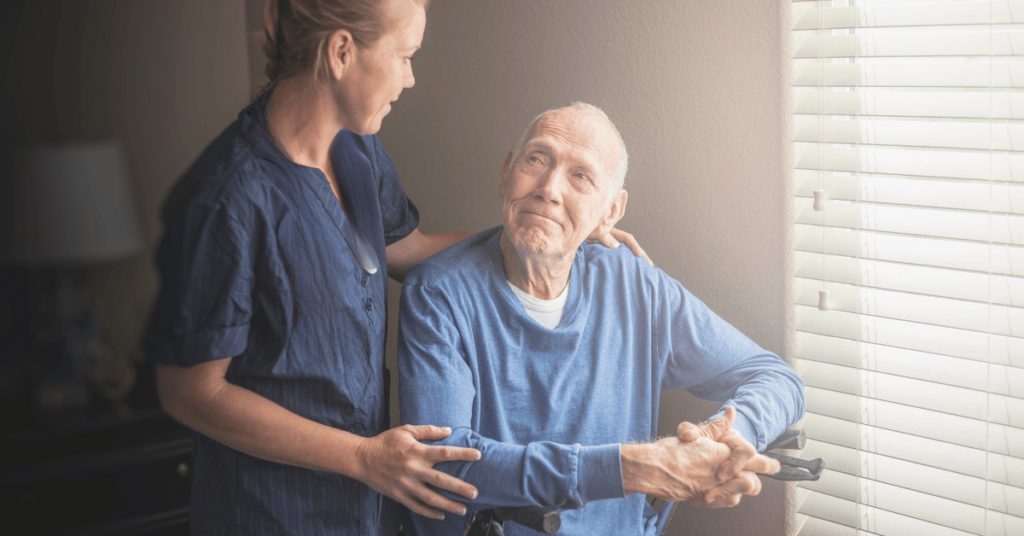“Christian” is well-loved by everyone who knows him. Though his motor skills are impaired, he manages life with a smile, shuffling with the support of a caregiver, or navigating in his wheelchair. His cooperative and cheerful personality makes him a favourite among staff and residents alike.
When Christian fell ill with a respiratory infection, his behaviour changed drastically. Once a regular at mealtimes, he began refusing food, staying in bed, and withdrawing from his usual routines. By the third day, his family discussed the possibility of transitioning him to palliative care. This decision shocked those who know Christian well, particularly, his caregivers, “Annie” and “Ella,” who are very close to Christian.
They were genuinely concerned that this mindset could prematurely end Christian’s life, especially since he had never expressed a desire to stop living. Christian had been looking forward to receiving a new wheelchair and a fresh pair of glasses. This situation didn’t seem right to them.
The Importance of Distinguishing the Fine Line Between Dementia and Delirium
Some staff assumed Christian’s sudden confusion and withdrawal were signs of dementia. However, Annie and Ella recognized a different possibility: delirium. They understood that his infection could cause temporary cognitive changes and believed his refusal to eat was related to his infection rather than a desire to give up on life.
Despite their insights, their concerns were dismissed by others, who undervalued the expertise of Personal Support Workers (PSWs). Yet, Annie and Ella persisted.
A Subtle Fight for Recovery
Annie and Ella understood that when a resident is placed on palliative care, it typically means focusing solely on comfort rather than pursuing aggressive treatments or interventions. This often translates to a more passive approach where, for example, if a person refuses to eat, it’s simply accepted.
Refusing to give up, Annie and Ella worked to help stimulate Christian’s appetite and restore his connection to the world. They encouraged him to sip fluids and offered small portions of his favourite foods. Christian loved the smell of coffee, so they made sure it was present every morning, hoping its familiar aroma would spark his interest.
Their patience paid off. One day, Christian asked for a sandwich. Though he ate only a small piece, it was a turning point. Slowly, over the next week, he regained his strength, clarity, and appetite.
By the end of the week, Christian was himself again—conversing, joking, and engaging with his caregivers. Annie and Ella were relieved, knowing their advocacy had made a difference.
A Brief Review of Delirium
Delirium is a sudden onset often indicating a serious underlying condition. It causes acute cognitive disturbance that typically manifests as confusion, disorientation, and an inability to focus or sustain attention. It is often temporary but can be severe, fluctuating in intensity over hours or days.
Delirium, therefore, is a medical emergency and requires immediate attention. Delirium, unlike dementia, is reversible and its underlying causes are commonly treatable.
Delirium is commonly triggered by medical conditions such as infections, medications, dehydration, or pain.
The Importance of Recognizing Delirium
Christian’s story underscores a critical lesson: delirium is not dementia. While both conditions can affect cognition, their causes and treatments are vastly different.
Misinterpreting delirium as dementia can have devastating consequences, as seen in Christian’s case. His apparent decline nearly led to premature decisions about his care. It was only through the knowledge, vigilance, and persistence of caregivers like Annie and Ella that he recovered.
Advocacy in Action
Christian’s recovery was not just a triumph of medical treatment—it was a testament to the power of informed, compassionate caregiving. Annie and Ella’s unwavering commitment to his well-being and their determination to advocate for him, even when their opinions were dismissed, saved his life.
When caregivers put their knowledge into action, it becomes more than just information; it becomes a weapon for change and a catalyst for life-saving care.
Caregivers must empower themselves with education and trust their instincts. By understanding the nuances of conditions like dementia and delirium, we can ensure that every person, like Christian, has the chance to return to the life and relationships they cherish.
It’s important to remember that not everyone in a care home is simply “waiting for death“; many are still living, still hoping, and still yearning for connection. Each day offers an opportunity to make a meaningful difference, to bring joy, and to reaffirm the dignity of those in our care.
As caregivers, we hold the power to create an environment where life, in all its forms, is celebrated and nurtured, no matter the circumstances.
Free 20-Minute Consultation (for NEW Clients)
If you found this article helpful and if you’re worried about a loved one or a friend and aren’t sure where to turn, you’re not alone. We’re here to help! Reach out, and together we can brainstorm solutions tailored to your unique situation. Start by visiting our website at https://dementiasolutions.ca/private-consulting/ to schedule your free 20-minute consultation with one of our experienced Dementia Care Advisors. We’re here to support you every step of the way.
Dementia Solutions Family Support Membership
If you are a family caregiver to someone with dementia, then we invite you to join our Dementia Solutions Family Support Membership by clicking here. Gain access to interviews and videos of other dementia caregivers, access tools and resources, and support sessions led by our Dementia Care Advisors and many more – exclusive for our members only.
DISCLAIMER:
This article is based on a true story; however, names, locations, and certain events have been altered to protect the privacy and confidentiality of the individuals involved. Any resemblance to actual persons, living or dead, or actual events is purely coincidental.
The contents of this blog are provided for information purposes only. They are not intended to replace clinical diagnosis or medical advice from a health professional.



